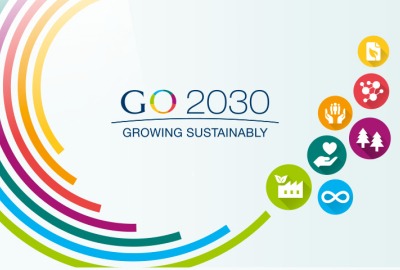Layers of Finance: environment, energy, the people and the future
The paper industry is a sector of surprising dynamism, featuring particularly complex issues and production processes.
How is the paper industry doing today? In this interview, Marco Tagliapietra, the CFO of Burgo Group, answers five questions about the diverse financial aspects of Burgo Group, from its position in the economic panorama to future developments, from the relationships with stakeholders to the ecological transition.
How would you describe the paper industry today?
I consider the paper industry very special and interesting. It is a traditional sector,almost old-fashioned, I would say: to an external observer, it might seem slow, not subject to change. But actually, it is a sector with a surprising dynamism, also exposed to significant exogenous international factors and, given the evolution of consumers' habits, subject to particularly complex issues and production dynamics.
The paper industry is subjected to important and global factors and, given the evolution of consumption habits, it requires a continuous rethinking of strategic approaches. It is also a capital-intensive sector and therefore requires a considerable amount of investments: consequently, this involves considerable financial complexity which, to a CFO like me, makes it even more interesting.
Ultimately, I must say that it is a fascinating sector, where all issues relating to the replacement of plastic materials and support for the ecological transition entail and represent unquestionable opportunities for all companies.
What are the tasks of the Chief Financial Office?
In the Chief Financial Office area, we take care of the administrative activities of the entire Group and therefore the management of accounting, the preparation of financial statements, and tax duties. We deal with planning and management control, with economic and financial reporting. We manage relationships with financial partners, therefore banks, insurance companies, treasury, and exchange hedging dynamics. We also deal with the management of the Group's real estate assets. In our area, we also carry out legal office activities: concerning the management of information systems, we also act as an enabler for all internal company processes.
What are the Burgo Group's development drivers in the short, medium, and long term?
In recent years we have witnessed intense evolution processes in the paper industry, involving various companies in Europe and Italy. Ours was no exception: for many years, the Burgo Group has also embarked on a transformation path that has led to increasingly diversifying the offer in terms of types of products and approaches to the reference markets.
The Group will continue along this path, accelerating where possible and seeking all those opportunities that arise from change, the mutation of consumption, consumption habits, and related technologies.
Furthermore, one of the essential development drivers of the Group will be the ecological transition process. I am talking in particular about the efficient use of energy resources and the increasing use of renewable energy sources. Finally, the involvement of the Group in the development of the circular economy will be a key driver for the paper sector.
How does the Burgo Group manage energy and energy production?
The Burgo Group, like all companies that produce paper, is a so-called energy-intensive business. This means that we produce a lot of energy, necessary for the production process. We are self-sufficient since we produce the energy we need, but we consume a really important amount of energy resources.
And this is why companies such as the Burgo Group have a vital role in the ecological transition process. We are investing in the efficiency of our power plants, alongside the development of electricity and energy generation from renewable sources.

Environmental sustainability and social responsibility have always been paramount in the Burgo Group's business approach. The Group commits maximum attention to these issues due to the intrinsic cultural and practical value of its product: paper.
Find out moreWhat are the key elements in the relationship between the Burgo Group and its main external stakeholders?
The Burgo Group is a historical reality in the Italian economic panorama. Like all historical industrial groups, its evolution over the years is somewhat a mirror of the evolution of the economy and finance of our country.
This undoubtedly influences the type of relationships the Group has with its external stakeholders. First of all, important stakeholders for the Group are the communities in which we have our paper mills and our offices. The relationship with these communities is very important. It is a social responsibility that the company feels very strongly about and that is also clearly perceived by the communities, thanks also to activities that the Group carries out for the benefit of the involved communities, even in a general economic context that is not always favourable.
Other essential external stakeholders for the Burgo Group are our customers and our suppliers who for years have guaranteed us their trust and their partnership. Also in this case I have seen that the relationship is generally based on great transparency and fairness, alongside strategic stability in relationships, taking into account our goals and those of the stakeholders.
Finally, other vital external stakeholders are the institutions that have financed the Group over the years, hence the banks. I encountered a great deal of attention from banks towards the peculiarities of a complex group like ours. There is a good intent to know us, to understand us better and better.
We have based these relationships on great transparency and steady openness to dialogue. Thus, over the years, each connection has developed solidly and constructively.

